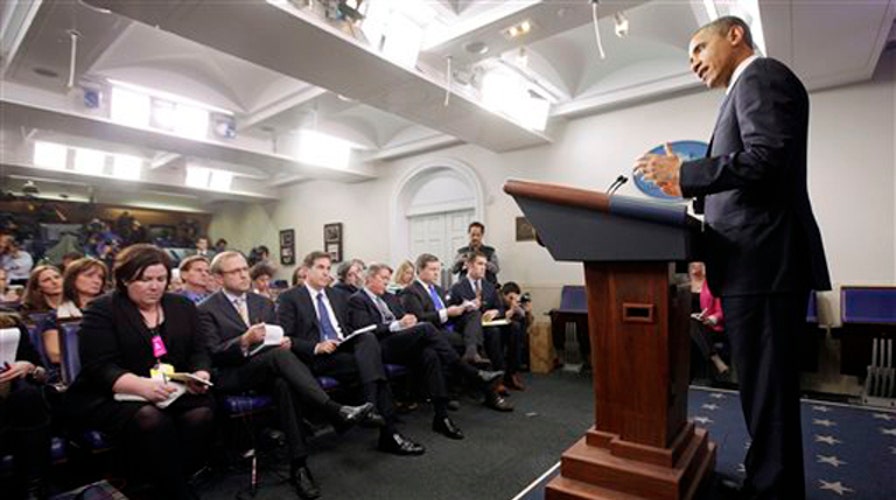The possibility that Washington will be ringing in the new year with a tax hike on millions of Americans grew substantially over the last few days, as lawmakers fled the Capitol for the holidays without having sealed a deal to avert the looming fiscal crisis.
Factoring in time off for Christmas, they have less than a week to agree to a solution. But while hope for an agreement is fading, Congress typically resolves its crises when bumping up against a hard deadline.
Here are some of the scenarios for how Washington could address the wave of tax hikes and spending cuts set to hit next week:
Lower the bar, and just pass something
Lawmakers on Sunday began to talk about the possibility of a scaled-down package. In this scenario, Congress could basically give President Obama what he wants on taxes -- a bill that extends current rates for those making under $250,000, while allowing taxes to rise for top earners. Or they could choose a different threshold.
This option, though, would probably not address difficult subjects like entitlement cuts or tax reform. These debates would be pushed off. And it may or may not address the roughly $110 billion in automatic spending cuts set to slam the Pentagon and other government agencies starting next month.
This isn't the preferred route, but lawmakers on Sunday opened the door.
Republican Sen. Johnny Isakson said on ABC's "This Week" he would support a bill that prevented tax increases only for the middle class, if that's his last option.
"If we get down to the end of this year and the only choice we have is to save taxes going up on the middle class, then I would support that," he said. "But I wish we would have a comprehensive bill that dealt with spending, dealt with entitlements and dealt with taxes altogether."
There could be a sequel to this scenario, though. If Republicans are able to prevent any increase in the debt ceiling from being part of this partial fix, they can use that as leverage in early 2013 to extract the kinds of entitlement cuts and other changes they want from Obama.
This is precisely the path Tennessee Sen. Bob Corker suggested to his fellow Republicans earlier this month.
Give compromise one last chance
Talks between Obama and House Speaker John Boehner stalled last week when Boehner peeled off to press his ill-fated "Plan B." The two, along with Senate leaders, could come together -- presumably patching in Obama, who is in Hawaii, by telephone -- and hammer out the kind of deal they appeared to be working toward until last week.
Judging by the framework of those proposals, this would include a tax rate hike on some Americans -- but the income threshold would likely be considerably higher than $250,000. And it would include spending cuts, and perhaps an extension of long-term unemployment aid.
The trick here would be forging a bipartisan coalition in the House to get it passed. The failed vote last week, on Boehner's bill to raise rates only on those making more than $1 million, proved that any bill that raises any tax rates cannot pass with only Republican votes. Boehner would need at least a couple dozen Democrats. A compromise that he, Obama and Senate Democratic Leader Harry Reid all endorse could attract those votes.
Give House Republicans what they want
The House has already passed a bill to extend the Bush-era tax rates for all. Plus the House has passed a bill to replace automatic spending cuts with reductions elsewhere in the budget. Theoretically, an exasperated Harry Reid could just call up the bill (or bills) for a vote in the Senate and, with a few Democratic supporters, pass the thing.
The question is -- would Obama, who has adamantly opposed such a bill, veto it?
Give Senate Democrats and Obama everything they want
The Senate has passed a bill to extend rates only for those making under $250,000.
Likewise, an exasperated John Boehner could call up that bill for a vote in the House and, with several dozen Republicans joining the entire Democratic caucus, pass it. To really give Obama what he wants, though, Congress would have to include some guarantee that the debt ceiling will rise by early 2013 without a mega-fight over more budget cuts.
This option, though, is fraught with risk for Boehner, who would likely see an uprising from conservatives.
Short-term patch, keep working
Even if Congress strikes a deal by Jan. 1, lawmakers might have to pass a short-term bill just to give them time to write and pass the bigger bill.
However, if Congress hits Dec. 31 with nothing to show for their work, they could pass a short-term bill extending current rates anyway, buying more time to negotiate something more ambitious.
Do nothing
This is where Congress excels, and it just might be the outcome. Lawmakers and the White House could let the tax hikes and spending cuts take effect Jan. 1. On one hand, the Congressional Budget Office says this would at least start to reduce the deficit. On the other, it risks a double-dip recession -- which in turn imperils the nation's finances, since tax receipts could decline.
If nothing is done by Jan. 1, Congress and the White House could still return to the negotiating table next year. If the impact turns out to be particularly devastating, they'd be all the more motivated to reach an agreement.





